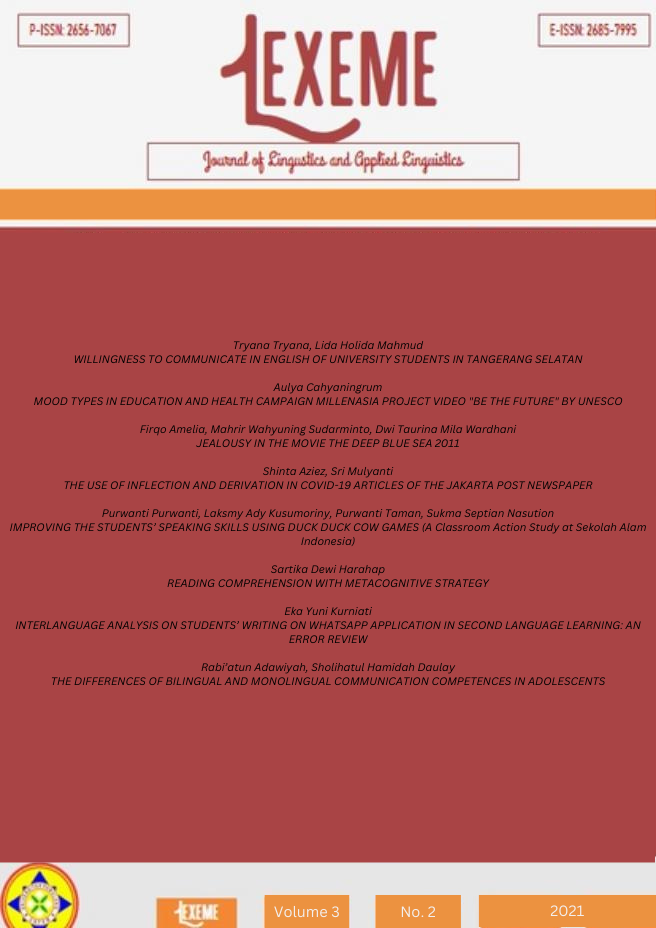INTERLANGUAGE ANALYSIS ON STUDENTS’ WRITING ON WHATSAPP APPLICATION IN SECOND LANGUAGE LEARNING: AN ERROR REVIEW
DOI:
https://doi.org/10.32493/ljlal.v3i2.18699Keywords:
Error, Interlanguage, Second language learning, Whatsapp, WritingAbstract
This kind of study was a qualitative content analysis. The purpose of this study was to examine errors that happened during students' written interactions on the Whatsapp application. The data were acquired using purposeful sampling since the researcher identified EFL university students who actively communicated via WhatsApp in written English. The researcher used documentation to collect data for this investigation. To ensure the validity of the data, the researcher took a screenshot of the student's writing that was typed in the Whatsapp group, and interviewed five respondents via Whatsapp voice calls that were recorded using a voice recorder on a smartphone, then transcribed and assessed qualitatively. The researcher collected data in a methodical manner and carried out several data analysis operations like collecting the errors, classifying them, providing and evaluation and explaining the errors and the factors. The researcher concluded from the research findings that both the source language (L1) and the target language (L2) have an effect on students' interlanguage writing output. The study discovered that the native language had an effect on literal translation by utilizing Indonesian grammatical patterns, Indonesian acronyms, omitting plural marker-s, and omitting BE. Meanwhile, the target language's effect was detected by the insertion of auxiliary verbs and the generalization of the past tense –ed.
References
Adnyani, N. L. P. S. (2011). Introducting Target Language Culture Through Movie Watching and Discussion. Jurnal Pendidikan Dan Pengajaran, (1–3), 77–83.
Afsyah, S. (2019). WhatsApp Application in English Language Teaching (ELT) Context: Media to Describe People. Utamax : Journal of Ultimate Research and Trends in Education, 1(1), 23–28. https://doi.org/10.31849/utamax.v1i1.2743
Aziez, F. (2016). An Analysis of Interlanguage Performed by Students of an Islamic Boarding School in Tasikmalaya. Academic Journal Perspective: Education, Language, and Literature, 4(2), 102–122
Corder, S. P. (1967). The Significance of Learner’s Errors. IRAL: International Review of Applied Linguistics in Language Teaching, 5(4), 161–170.
Ellis, R. (1995). The study of second language acquisition. Oxford, UK: Pxford University Press.
Han, Z.. (2005). Fossilization in Adult Second Language Acquisition. Toronto: Multilingual Matters.
Handarini, O. I., & Wulandari, S. S. (2020). Pembelajaran daring sebagai upaya Study From Home (SFH) selama pandemi Covid 19 [Online learning as a Study From Home (SFH) effort during the Covid 19 pandemic]. Jurnal Pendidikan Administrasi Perkantoran (JPAP), 8(3), 496–503.
Hamad, M. M. (2017). Using WhatsApp to Enhance Students' Learning of English Language" Experience to Share". Higher Education Studies, 7(4), 74-87.
Fauziati, E. (2011). Interlanguage and error fossilization: a study of Indonesian students learning English as a foreign. Indonesian Journal of Applied Linguistics, 1(1).
Fauziati, E. (2017). Native and target language influence on the students’ interlanguage productions a case of Indonesian EFL compositions. Indonesian Journal of Applied Linguistics, 7(1), 54–63.
Kheryadi, K. (2018). The Implementation of “WHATSAPP†as a Media of English Language Teaching. Loquen: English Studies Journal, 10(2), 1-14.
Susilawati, S. & Supriyatno, T. 2020. Online Learning Through WhatsApp Group in Improving Learning Motivation in the Era and Post Pandemic COVID-19. Jurnal Pendidikan: Teori, Penelitian, dan Pengembangan, Vol.5, No.6 Bulan Juni Tahun 2020 Halaman: 852—859. http://journal.um.ac.id/index.php/jptpp/
Uzunboylu, Hüseyin & Keser, Hafize & Ozdamli, Fezile. (2011). The trends in technology supported collaborative learning studies in 21st century. World Journal on Educational Technology. 3.
W. Mwakapina, J., S. Mhandeni, A., & S. Nyinondi, O. (2016). WhatsApp Mobile Tool in Second Language Learning: Opportunities, Potentials and Challenges in Higher Education Settings in Tanzania. International Journal of English Language Education, 4(2), 70. https://doi.org/10.5296/ijele.v4i2.9711
Zam Zam Al Arif, T. (2019). the Use of Social Media for English Language Learning: an Exploratory Study of Efl University Students. Metathesis: Journal of English Language, Literature, and Teaching, 3(2), 224–233. https://doi.org/10.31002/metathesis.v3i2.1921







